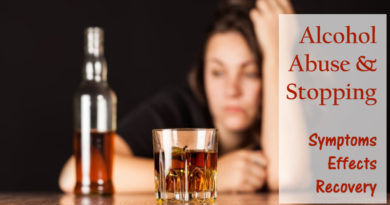Life After Addiction – How to Prevent a Relapse
Developing a substance use disorder can happen to anyone, even to people who seem to have a normal, untroubled life. Regardless of what has made you turn to alcohol or illegal substance abuse, once you become an addict, rehabilitation should become your primary goal.

The entire recovery process can be challenging, but once you reach a sober state, the sense of reward and satisfaction will be extremely high. However, just because you have successfully rehabilitated yourself, it doesn’t mean your addictive tendencies are entirely gone.
Relapses can occur even after long periods of abstinence, so just because you haven’t been drinking alcohol for a couple of months or haven’t taken any drugs, it doesn’t mean you won’t experience cravings again, or you’re completely healed from your past addiction. Acknowledging the risks involved here is necessary.
How can you actually avoid a potential relapse? How should your lifestyle look like? The following tips might make this topic a bit clearer for you?
Maintain a proactive, positive attitude
Positivity is a fundamental factor in your healing journey. Without maintaining a proactive attitude on life, you’ll be more frequently tempted to give up on your goals, and might fall into your old ways again. While negative thinking is often normal in these cases, you should develop some coping mechanisms that allow you to quickly overcome a negative thought.It’s not about never having negative feelings or thoughts, it’s about learning how to let go of them and riposting with positivity instead.
Calling your therapist, finding good company, going out for a walk in the park, engaging in one of your hobbies – there are many things you can do when you’re not feeling great, and want to rebalance your emotions and boost positive thinking.
Get involved in the right rehab treatment programs
If you’ve managed cutting of alcohol from your life on your own, it means you have the necessary willpower. However, professional treatment, and support group programs exist for a reason. The odds of dealing with a relapse are much higher when you haven’t been involved in an optimal rehabilitation program.
Because you are already sober, search for comprehensive recovery treatments that can sustain your achievements. At Help4addiction.co.uk London, experts suggest that each rehabilitation program should be tailored to suit the patient’s specific situation. Receiving professional assistance in your battle against alcohol or drug abuse can do more for you than you think. Also, consider joining support groups and work with others towards maintaining a clean life.
Cut off toxic friends
During the time you’ve spent abusing alcohol or drugs, you’ve probably made friends with the same destructive behaviour as yours. It can be difficult to completely change your routine, not go out with the people you’ve become fond, but this is a necessary step.
Being exposed to alcohol or drug will only make your journey more unbearable and difficult, and it will certainly contribute to a potential relapse. As long as your friends aren’t willing to work on their life and follow your example, it’s simply best if you cut off communication entirely.
Surround yourself with people who have your best interest in mind, who will help you avoid temptation, and not the other way around. This is one of the first things you’ll need to do as soon as you go sober.
Learn your triggers and avoid them
Self-exploration stands at the base of complete healing and a happy, rewarding life. You need to get to know yourself properly, in order to keep your focus, and maintain sobriety. Try to figure out what usually triggered your most unpleasant drug or alcohol abuse episodes, and try to avoid those things entirely.
Triggers are conditions or situations that help to elicit cravings. The desire to start using alcohol or substances again will happen even when you’re doing your best to stay on track, but knowing your most common triggers and avoiding them can be very helpful.
- Don’t consider cravings as a sign of failure – these are normal experiences, so accept them as understandable occurrences during this period of your life.
- Dealing with cravings doesn’t mean your treatment isn’t working – avoid this common misbelief
- Identify your most common triggers and how you can stop cravings in those scenarios
Ensure a healthy lifestyle – balanced diet and exercise
A healthy way of living will have a positive impact on your addiction recovery journey. If you include in your daily schedule exercise and balanced meals, you can control your potential craving better and avoid relapses easier.
If you have a sedentary lifestyle and are always eating junk food, it will be much more difficult for you to restrain yourself from alcohol or drug use. Create a dietary plan that supports your journey, make sure to work out for at least 30 minutes a day, and understand the importance of having a healthy lifestyle.
Improve sleep quality
The health-restorative benefits of a good night sleep are usually the most important ones here. After months or years of drinking and taking drugs, you’ve tampered with your brain chemistry, and managing to fall asleep easily and to rest properly at night is now harder. Try to re-establish healthy sleeping patterns. Always go to bed at the same hour, make sure you have a comfortable bed and a sleeping environment that fosters rest, and you’ll manage over time to enjoy that deep, restful sleep one again.
Reaching sobriety isn’t the only goal here, but actually managing to stay clean your entire life from now on. Because the risk of dealing with a relapse always exists, it’s important for you to take the right means of precaution and adopt lifestyle habits that support your recovery journey. Overcoming addiction can be extremely difficult, and you probably don’t want your efforts to be in vain, and for you to fall back into your old harmful ways. While the topic is complex, and each person heals differently for this life experience, these few tips could be quite useful. Keep in mind the suggestions mentioned here, and staying on track will become a bit easier.



